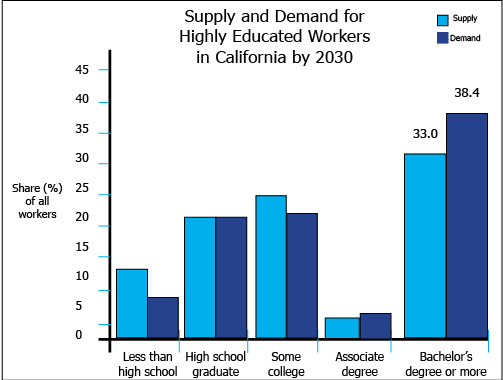STAR // Kayla E. Galloway
A study was released by the Public Policy Institute of California earlier this month surrounding the prediction that the state of California—if trends continue—will fall short 1.1 million graduates with bachelor’s degrees by 2030.
The state’s higher education system being a critical factor of its economic progress, will the generation being thrown into the ever-changing job market be able to compare to the positions left behind for them? This concept is labeled as the “workforce skills gap” and even the arrival of highly educated workers from elsewhere would be unlikely to fill a gap this large.
Over recent years, college graduates have been exposed to lower rates of unemployment and higher wages than other workers, despite the recession, suggesting that college degrees have become increasingly more valuable in California’s job market.
The recession generated both a substantial decline in employment and a change in the architecture of occupations in California.
The economic situation also triggered extreme decreases in funding for public colleges and universities, leading to restrictions on enrollment and increases in student debt, according to the Public Policy Institute of California’s study in the years of 2007-2009.
Looking into what the job market and economy will be like in 2030 incorporates the retirement of the baby boomer generation, which will cause a major population shift that will have significant effects on California’s job market.
“It’s funny because I don’t feel like [the study is] true, I feel like there’s not enough jobs out there for people,” said Sophomore Ariella Tiber.
According to recent economic trends,the institute projects 38 percent of all jobs will depend on workers with at least a bachelor’s degree, but only about 33 percent of California workers will have one in 2030.
Many believe the severe demand for new highly educated workers is a tremendous challenge to fulfill.
The share of international immigrants arriving with college degrees, particularly in the technology field, has played an important role in increasing the percentage of young workers with bachelor degrees, but unfortunately will not be sufficient enough to close the gap.
During the recession, the state lost nearly 8 percent of its jobs, leading economists to lower their long term forecasts of job growth. Some jobs lost during an economic crisis are recovered as the economy improves, but some do not return at all. ]Even after several years of job growth, unemployment rates remain far higher than they were before the recession.
The increase in unemployment have been among workers with only a high school diploma.
Even for workers with a bachelor’s degree, unemployment rates were higher in 2014 than in the pre-recession year of 2007. But they remain far lower than the rates for other, less educated workers—evidence of a continuing strong demand for highly educated workers.
“On the supply side, we are likely experiencing a job matching problem, where our graduates are not ready for a lot of jobs, and over qualified for others,” said Professor of Economics Robert Eyler. “The demand side is fickle. [The market] wants relatively cheap labor that is talented, so there is a lot of importing. Again, there is a mismatch issue there. We may not be preparing workers for what is being demanded by the rest of the world.”
According to the Federal Reserve Board of San Francisco, a college graduate earns roughly $830,000 more in lifetime that an individual with a high school diploma. These wage gains suggest that college degrees are increasingly valuable in the present job market.
Increasing college enrollment and completion has multiple, wide-ranging benefits. Wage premiums for college graduates in California are at an all time high and unemployment rates are far lower compared to less educated workers.
Improving educational attainment has other societal benefits as well such as the creation of a more knowledgeable and engaged society.
If the state, its educational institutions, and its people are able to improve educational outcomes, California and its residents will experience a much more successful future, with higher incomes, greater tax revenues, and lower use of social services.




































